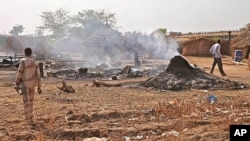South Sudan's announcement that is withdrawing its forces from a disputed oil town has done little to relieve tension near the border. Reports of continued Sudanese air raids in southern territory underscore the constant threat of violence.
|
Sudanese officials claim that 400 South Sudan troops were killed during the battle for the flashpoint town of Heglig, an oil-producing area claimed by both countries. South Sudanese troops completed their withdrawal from Heglig Sunday, saying the number of soldiers killed is just a fraction of what Sudan claims. Estimates of casualties in Sudan are impossible to verify. |
Lucia Juah was home with one of her three children when she heard the bomb strike.
“When it happened, it just came abruptly,” she says, “my kids were on the playground at the time, luckily they were unharmed. But my neighbor's house was all burned up.”
Juah lives in a grass hut about 70 meters from the crater left by the bombing last week in Bentiu, the capital of South Sudan's Unity State. A trail of ash and debris spreads in all directions from the site, nearly to Juah's doorway. Officials say five people were killed in the attack.
Learning to live with it
The bombings have not stopped, even after South Sudan's military, the SPLA, announced Friday it was withdrawing from the disputed town of Helig, north of Bentiu, the site of the worst fighting between the Sudans since the south declared independence last year.
Unity State Information Minister Gideon Gatpan says residents in Bentiu have learned to live with it.
“Most of the locals, they are conversant with the fashion of the hostilities that are always driven by the Khartoum regime. So it's not new, Antonov is not new, gunship is not new, jet fighter is not new, so communities are not so much scared to be leaving their own households, to move outside.”
Calls for settlement
The African Union and the United Nations had called for SPLA troops to withdraw from the town, and urged both sides to return to negotiations over the final status issues remaining between the newly separated countries.
U.S. President Barack Obama also called for both sides to end hostilities in a video message released Saturday.
State Minister Gatpan says the diplomatic community should do more to help resolve the boundary dispute at the heart of the conflict.
"The Republic of South Sudan and the people of Unity State in particular are demanding that the international community have a better understanding of the current cause of the conflict and again to actually prioritize the border demarcation and to ensure there's the deployment of neutral troops as we wait for the border demarcation to proceed."
Conflicting accounts
Though the south claims it ordered the withdrawal due to international pressure, the casualties at the SPLA military hospital tell a different story.
More than 100 soldiers lay around in the shade, some badly burned by bombs dropped by aircraft, others suffering fractures and sprains. They say fighting had been intense the last few days before the pullout.
Martin Amousa, a 26-year old private, was blinded by smoke following a missile attack on his position near the frontline, about 30 kilometers north of Heglig.
He can barely see more than five meters, but says he is determined to get back into the fight.
“Because we don't want the colonization of the Arabs,” he says, “This is my homeland; nobody can chase me away from here.”
Avoiding full-scale war
The two sides have avoided full-scale war for now, but the threat of a return to violence is apparent.
South Sudan withdrew from fighting in Heglig once before during the past two weeks, only to return a few days later to retake control.
On the road to the capital Juba, truckloads of SPLA soldiers streamed north toward Bentiu as recently as Saturday night, giving the impression that South Sudan may be reinforcing its positions.




